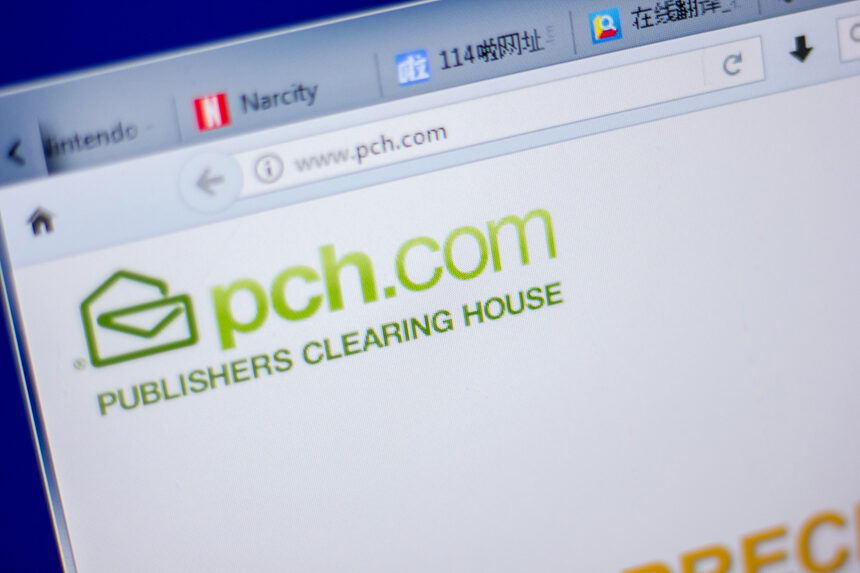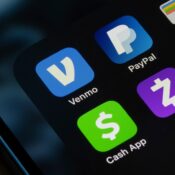Steve Weisman is a lawyer, college professor, author, and one of the country’s leading experts in cybersecurity, identity theft, and scams. See Steve’s other Con Watch articles.
Recently Alrick Anthony Gardner was indicted on charges alleging he operated a sweepstakes scam that stole millions of dollars from unsuspecting elderly victims. According to the U.S. attorney for Connecticut, Gardner and others working with him called their marks telling them that they had won a Publishers Clearing House sweepstakes, but that in order to receive their winnings they needed to pay fees and taxes directly to the company. In an effort to make their scam look legitimate, the criminals mailed the victims fake documents including a “winning notification” and a letter that appeared to come from the IRS.
Publishers Clearing House, the sponsor of some of the most popular legitimate sweepstakes in the country, has numerous prize giveaways each month, making them fertile ground for imposters.
Recently there has been an increase in reports of scammers calling people on the telephone or sending notifications by regular mail telling them that they have won one of the Publishers Clearing House prizes, but they must pay fees or taxes before being able to receive their prize. No legitimate prize giveaway requires you to pay taxes or administrative fees directly to the sponsor.
In other instances, the criminals will notify their victims that they have won and then proceed to ask for personal information such as bank accounts or Social Security numbers in order to steal their identity. The real Publishers Clearing House does not request any information when their winners are initially notified.
It is hard to win any sweepstakes. It is impossible to win one that you have not even entered, and yet scam artists have found that it is extremely lucrative to convince people that they have won.
As with many effective scams, the pitch of the swindler may seem legitimate. Income taxes are due on prize winnings, but with legitimate sweepstakes they are either deducted from the check before you receive it or you are responsible for paying the taxes directly to the IRS. No legitimate organization collects taxes on behalf of the IRS from winners.
In other instances, the con artist tells the “winners” that in order to collect their prizes, they need to pay administrative fees. Often, the victims are told to send the fees by prepaid gift cards. Prepaid cards are a favorite method of payment for scams because they are the equivalent of sending cash. They are impossible to stop or trace. Again, no legitimate organization requires you to pay administrative fees in order to claim your prize and no legitimate business or government agency ever requests payment through gift cards.
Fortunately, there is an easy way to know if you have legitimately won one of Publishers Clearing House’s major multi-million dollar prizes. Publishers Clearing House only contacts major prize winners in person or by certified mail. They do not contact winners by phone, email, or text message.
In addition, no winners of the Publishers Clearing House sweepstakes are ever required to make a payment of any kind to claim their prize, so if you are told that you have won, but are required to send money before you can claim your prize, you can be sure that it is a scam.
If you have any questions as to whether or not you actually are a winner of a Publishers Clearing House sweepstakes, you should call their customer service number of 1-800-459-4724. Don’t trust any other telephone number that may be provided to you by anyone informing you of your win.
Become a Saturday Evening Post member and enjoy unlimited access. Subscribe now




Comments
Como save uno si es ganador
keithhickman I been lied to about I won prize patrol car coming never received nothing but sending them gift cards
Rec’ed voicemail
“Hello good day this is a secured phone call from the publishers clearing house sweepstakes. This call is to solely inform you that you have one our monthly sweepstakes and lottery competition valued at 2 ,000, 5 00. Thousand US dollars, 7 000 weekly for life and a brand new 20 2 4, Mercedes-Benz Your claims code is 9 9 6 0 7 P C H once again 9 9 6 0 7 P C H To claim your winnings , please contact your claims agent Dave Sayers at the claims department phone number 5 1 6- 9 1 9- 2 3 6 1 once again , 5 1 6 9 1 9 2 3 6 1 4 press The number one to be transferred To the claims office thank you…”
I recievef a letter claiming that im 1 of 3 winners. they didnot ask for money
will someone help me ?
Someone just text me telling me I want a publisher clearing House I don’t know what to go about
Nearly fell, for it. Looked good, too good. So I cracked PCH, and ‘frscovrref the scam’ so darn, convincing. On intergram too. Blocked the B’stard. Now need to tell intergram, so they can do the f..k..s.
Got an email claiming that I had won $3 million in a (PCH) Email Raffle Draw. All I need to do to collect was give:
1. Legal Full Name:
2. Mailing Address:
3. Contact Phone Number :
4. Date of Birth:
5. Occupation:
And send it to ([email protected])
Sounds a little more than fishy to me. Is there anything that can be done to these scammers? I’m sure there a lot of people that are desperate enough to fall for these scams in these days and times especially with the economy in an out of control spin!
I was contacted by someone saying they were from publishers clearing house and that I won. They gave me this number 202016x and a phone # 0817166503 to call an collect. They said I am the 2nd prize winner. Since I don’t believe any about anything before checking things out because there are too many scammers I decided to check it out. My name is
I received a call from clearance Matthews saying I won 250,000 plus 5,000 a week for 7 months and a Mercedes benze.i had to buy something to put my cash app card and go 2 bank card in and pay to ship overnight but it went to ft Lauderdale instead of sunrise FL so don’t know what going on it cost 29.45 to send
scammer
claiming to be
Andy Goldberg
from Publisher Clearing House
saying I was a winner of
2.5 million
&
a 2033 Merceded Benz
I received a call yesterday but did not check my voice mail until today. I tried the number for PCH prize patrol and it did not work, so I called the number that had called me. I had won $5,000,000, $7000 each and every week, and a 2022 Benz…….then he asked me to pay a registration fee of $995! NO THANK YOU…I FORFEIT!!
Check the # your actually being called from against the # they give you to call back if there not the same it’s a scam. !!!
I am receivied a voice mail today say I had won the big prize. Gave me a phone # to call 929-329-8313 and give code WIN8197S I called it I knew it was a scam but I like to call back and bug them. It’s fun! But the call actually came from a different # of 779-272-0548. That’s a dead give away right there. That # wasn’t even a working # and the # I called wasn’t available at the time. Dead give away also as it being a scam caller.
I too received a call today October 13,2023 from David Sawyer telling me I won $7 million and a Silverado truck but I needed to buy a $500 gift card at Walmart to cover taxes. I knew then this was a Scam. I always heard you do not pay money to collect any price. So I didn’t. Please be careful.
Got a call from a “John Prince” informing us we had won $7.5 million dollars from PCH. It was a nice, cordial, conversation but when he started talking about sending them money we put the brakes on it and told him we couldn’t afford to lose money.He transferred us to a “financial advisor”, his name is Michael Walters. The thought of winning that much money is very enticing but it didn’t feel right. I called the PCH phone number and they, in fact, verified that I’m not a winner. This creep swore to God that it’s not a scam, he should be struck by lightening
I was just texted by someone claiming to be Fabian Garcia from The PCH office saying I have won a million dollars from PCH and did any agents contact me yet. And when I said No he said ( Well I’m letting you know ) also asking for a fee for processing and courier to deliver my winnings. I know it’s a scam and I let him continue on and think he’s got me then he gets the GONG. Jerks I tell you so look out everyone cause they are still out there. Why can’t they catch them? Please do.
I just received a call from a man who said he was Dave Sawyer with PCH and I had won $250 000 plus $7000.00 per week he gave me a ticket and confirmation number Then he said I must go to one of their sponsors store and pay $259.00 active fee. I told him I had to think about it and asked for phone number to call him back The phone number was 1-876-213-6048. I know this is a scam but I am advising you. Scam
Does Sylvester work for PCH he says I won a monthly payment.
i just had a phone call from some jerk.he told me i was winner of pch priz for 10.000a week forever i got excited as it sounded real.but i soon realizedit was a scam. so people watch out because they are clever. now my heart is broken. ha ha i am 89 yrs young so i need money.
Hi my name is Ligaya Hemming
I saw my name in your winner list, but I don’t hear from you guys, I’m just wondering what is price is?
Have a good day and
Thank you…
*It’s real. People do win.
*You NEVER have to buy a thing.
*PCH NEVER asks YOU for money.
*If YOU win, the article says PCH either shows up at your door, or this article says you receive a Certified Letter.
*NEVER give your name, address, phone number, Social Security Number to anyone.
*Do not give ANYONE your Bank Account Numbers.
*Do not send them ANY money!!!
I have ordered from them several times, and there is not junk! Yes, I enter the sweepstakes, if I win that’s great.
Best of luck to all
Soy Jamal yassine
Alguien me contacto por messenger y me dijo que yo había ganado un premio de 10000000 de dólares y una camioneta Ford y me mando un certificado creo que es falso igual me envió una carta del FBI QUE ERA YO EL GANADOR NO SE QUE PUEDO HACER
How do I find out
Win
I was contacting device publishers clearing House telling me that I won $500 million dollars and I was to come to meet them at Walmart and get him 750 dollars before they can release my money they even had a bank president New York the Federal Bank that I spoke with they told me I forfeited my money because I called him a rare horses rear end but I was getting phone calls from all over to come and get my money for months I need some help
I have been scammed and am being scammed my Mr. Goldberg and John Wright.
Am I a scam victim? Does PCH ask for money before you win?
I want to know if I actually lost this April 30 I sure don’t understand if so if after. Doing 3 or 4 months more to win and I did Ty I sm going to have to give up I can no longer give my life to publishers clearing house day and night I have to get back with my family so if I totally lost haventy won one thing remove me please please answer and tell me yes or no If I lost I want geek off my phone please have a blessed night
When I started playing the REAL Publishers Clearing House Sweepstakes . I was in disbelief there was no chance it existed. Then I done research and more research about the Awesome Team they’ve established as a whole Company. I’m not saying there’s not scamers and fraudsters commenting crimes and copying the real Publishers Clearing House. I’m continuing to learn more about the lotto and many games along with raffles and much more. There is infact a real Publishers Clearing House they are famous for magazines. IM EXPECTING THAT KNOCK AT MY DOOR ANYTIME NOW. #harrisbecky430pch#1fan
Read years ago that no one ever wins the Publishers Clearing House.
Save your stamps and stop buying the junk they want you to.
A plea to all…save your families!
Straight into the trash bin, Steve.